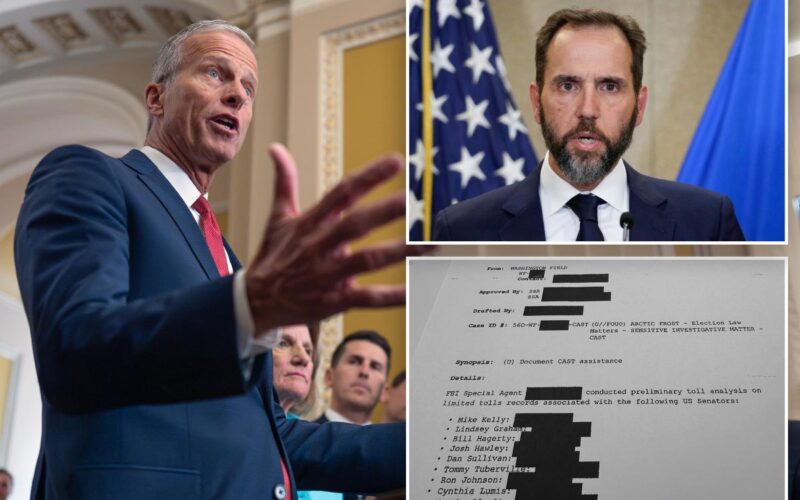WASHINGTON — A provision tucked into the government funding bill that passed the Senate on Monday would compensate GOP senators whose phone records were seized without their knowledge during former special counsel Jack Smith’s Arctic Frost investigation into efforts to overturn the 2020 election.
Up to nine Senate Republicans would be able to sue the government and be eligible for up to $500,000 in damages, plus attorneys’ fees, for each instance in which their call logs were coughed up to the feds.
Phone carriers would also be required to immediately notify senators and their offices if their devices, accounts, records or communications are sought — unless the lawmakers are the target of a criminal investigation.
In such cases, judges can issue a 60-day nondisclosure order if they find an imminent threat to “the life or physical safety of any person” or that the targeted senator poses a flight risk, that evidence would be destroyed, that witnesses would be intimidated or that the investigation would be jeopardized.
Following the initial 60-day period, the non-disclosure order can only be extended to protect someone’s life or physical safety.
The language was added to an appropriations bill that would fund legislative branch activities until Sept. 30, 2026.
The measure was passed Monday as part of a package of funding bills in the Senate to end the 42-day government shutdown.
Sen. Ted Cruz (R-Texas) confirmed Monday that Majority Leader John Thune (R-SD) was “directly” responsible for the inclusion of the provision.
“Leader Thune inserted that in the bill to provide real teeth to the prohibition on the Department of Justice targeting senators,” Cruz told Politico.
At least 10 GOP lawmakers — including the Texas Republican — had their phone metadata handed over to Smith after subpoenas were issued to their carrier, Verizon, in May 2023. Two other unidentified lawmakers had the same information sought from their AT&T accounts, but it wasn’t delivered.
The ex-special counsel also sought phone records from Cruz’s Senate office, but none were responsive to the subpoena, a source familiar with the covert request previously told The Post.
Cruz’s subpoena was accompanied by a non-disclosure order, signed by DC US District Court Chief Judge James Boasberg, that hid the records request for at least a year.
“The abuse of power from the Biden Justice Department is the worst single instance of politicization our country has ever seen,” added Cruz, who has called for Boasberg’s impeachment. “I think it is Joe Biden’s Watergate, and the statutory prohibition needs to have real teeth and real consequences.”
It’s unclear whether the House will allow Rep. Mike Kelly (R-Pa.), whose call logs were also obtained by Smith, to sue the DOJ. Reps for the Pennsylvania Republican did not immediately respond to a request for comment.
No language in the bill accounts for incidents involving executive branch officials, though President Trump’s government-issued phone was seized by Smith’s team.
The provision apparently rankled Sen. Martin Heinrich (D-NM), the top Democrat on the appropriations subcommittee dealing with the legislative branch.
“I am furious that the Senate Minority and Majority Leaders chose to airdrop this provision into this bill at the eleventh hour — with zero consultation or negotiation with the subcommittee that actually oversees this work,” Heinrich (D-NM) said in a statement to Politico. “This is precisely what’s wrong with the Senate.
However, at least one Senate Democratic aide working for leadership noted to the outlet the bill’s text now “protects the institution and Senators from an out of control Pam Bondi run Department of Justice.”
Smith has asked to testify before the Senate Judiciary Committee about his investigation to clarify his decision-making. His probe led to the indictment of President Trump in August 2024 on four counts related to 2020 election interference — but the case was dismissed following his election to a second non-consecutive term this past November.
The Judiciary panel’s chairman, Sen. Chuck Grassley (R-Iowa), has requested further documentation from Smith, as well as grand jury materials from the DOJ that would show the ex-prosecutor’s reasoning for the phone subpoenas.
Grassley’s oversight has revealed that Smith’s office fired off hundreds of subpoenas to GOP groups and individuals, characterizing it as a “fishing expedition,” which became “the vehicle by which FBI agents and DOJ prosecutors could improperly investigate the entire Republican political apparatus.”
FBI whistleblowers provided Grassley with much of the information — including memos signed by Biden’s former Attorney General Merrick Garland and bureau director Christopher Wray authorizing the Arctic Frost probe.
House Judiciary Committee Chairman Jim Jordan (R-Ohio) has also demanded a transcribed interview with Smith.
Reps for Thune’s office didn’t immediately respond to a request for comment.








